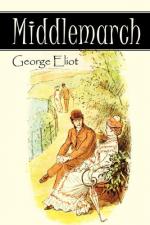Introduction
Summary Of Middlemarch By George Eliot Middlemarch, published in 1871-72, is widely regarded as one of the greatest English novels, offering a deep and nuanced exploration of life in provincial England during the early 19th century. It is a richly detailed social novel that examines a wide range of themes, from personal ambition and social reform to marriage, idealism, and the clash between tradition and progress. Set in the fictional town of Middlemarch in the early 1830s, the novel is a portrayal of a society undergoing significant social and political change, particularly in the realms of medicine, politics, and gender roles.
George Eliot (the pen name of Mary Ann Evans) was known for her psychological insight and her social realism, and Middlemarch stands out as her masterpiece. The novel weaves multiple character arcs, each of which contributes to a broader exploration of society, morality, and individual desires.Summary Of Middlemarch By George Eliot
Read More
Main Plot Overview
The Setting of Middlemarch
The novel is set in the small, fictional town of Middlemarch, a microcosm of early Victorian England, reflecting the political, social, and economic changes of the time. The story revolves around several intertwined characters who embody different aspects of this changing world. Middlemarch itself, though provincial, is home to ambitious individuals trying to navigate the complexities of their personal and professional lives.
The social tensions of the time, such as the rise of industrialization, changing political ideologies, and shifts in class structure, form the backdrop to the personal dramas of the characters. At its core, Middlemarch is about the pursuit of meaning, the struggle for personal growth, and the limitations that society places on individuals, particularly women.

The Major Characters
- Dorothea Brooke
Dorothea is the novel’s primary female protagonist, a young woman of exceptional intellect and idealism. She is deeply passionate about social causes and believes in the power of knowledge to change society. Dorothea’s ambition to contribute to a higher cause leads her to marry the elderly scholar Mr. Casaubon, whom she believes can guide her intellectual development. However, she soon realizes that Casaubon is more interested in controlling her than in helping her grow. After Casaubon’s death, Dorothea develops a romantic relationship with Will Ladislaw, Casaubon’s younger relative, despite the social disapproval it brings.Summary Of Middlemarch By George Eliot

Summary Of Middlemarch By George Eliot - Dr. Tertius Lydgate
Dr. Lydgate is a young, idealistic doctor who arrives in Middlemarch with grand ambitions of reforming medical practice. He is keen on modernizing healthcare and introducing scientific principles into the field of medicine. However, Lydgate is soon thwarted by his debts, his difficult marriage to Rosamond Vincy, and the conservative nature of Middlemarch’s society. Like Dorothea, Lydgate is initially motivated by noble ideals but ultimately faces the harsh realities of human limitations and social constraints.
- Mr. Casaubon
Mr. Casaubon is an elderly scholar who marries Dorothea, seeing her as a means to further his intellectual work on a grand, unfinished project on the “key to all mythologies.” He is portrayed as arrogant, controlling, and obsessed with his academic pursuits. Casaubon’s character represents the theme of intellectualism that fails to engage with real human needs, particularly the emotional needs of those around him. His marriage to Dorothea is a profound disappointment for her, as she discovers that he views her as little more than an assistant to his academic work.
- Rosamond Vincy
Rosamond is a beautiful, charming young woman from a wealthy family. She marries Dr. Lydgate in the hopes of elevating her social status, but she proves to be an ambitious and materialistic partner. While outwardly polished and gracious, Rosamond is more concerned with appearances and wealth than with intellectual or personal growth. Her relationship with Lydgate is strained due to her shallow nature and her inability to understand Lydgate’s higher ambitions.Summary Of Middlemarch By George Eliot
- Fred Vincy
Fred is Rosamond’s brother and the son of the wealthy Mr. Vincy. He is charming but immature, irresponsible, and lacking in ambition. His relationship with Mary Garth, a sensible and morally grounded young woman, is central to his development. Through his character arc, Eliot explores themes of growth and responsibility, as Fred gradually matures and begins to take ownership of his life.
- Mary Garth
Mary is a practical, intelligent young woman who works for the Vincy family. She is the romantic interest of Fred Vincy and is portrayed as a model of virtue and common sense. Unlike many of the other characters, Mary is deeply connected to the realities of everyday life and does not indulge in fantasies of grandeur or intellectual pursuits. Through Mary, Eliot presents an alternative to the more idealistic or self-serving characters in the novel.
- Will Ladislaw
Will is Mr. Casaubon’s younger relative and an intellectual artist. He initially appears as a charming but somewhat reckless figure, initially estranged from his wealthy family due to his relationship with Dorothea. His affair with Dorothea represents a clash between personal passion and societal norms, and his character embodies the tension between idealism and social realism.Summary Of Middlemarch By George Eliot
Plot Summary
The novel opens with the introduction of Dorothea Brooke, a young woman full of intellectual aspirations and a desire to contribute to social reform. She is highly idealistic and believes that by marrying Mr. Casaubon, she will be able to assist him with his scholarly pursuits and contribute to his grand project. However, after their marriage, Dorothea is disappointed to find that Casaubon is more concerned with controlling her and using her as a tool in his intellectual endeavors rather than allowing her to grow and contribute as an equal partner.Summary Of Middlemarch By George Eliot
Read More
Meanwhile, Dr. Tertius Lydgate arrives in Middlemarch with the goal of reforming the town’s outdated medical practices. He is initially greeted with enthusiasm by the local community but quickly faces resistance from both the medical profession and the townspeople. Lydgate’s idealism and ambitions are complicated by his growing debt and his marriage to Rosamond Vincy, a woman more concerned with wealth and social status than with Lydgate’s progressive ideas.Summary Of Middlemarch By George Eliot
As the novel progresses, Dorothea’s relationship with Casaubon deteriorates, and she eventually begins to develop feelings for Will Ladislaw, Casaubon’s younger relative, despite the social and familial challenges that this relationship creates. Casaubon’s death frees Dorothea to pursue her relationship with Will, but their union is met with significant social disapproval because of Will’s lower social standing.
Dr. Lydgate’s career falters as his debts and marriage to Rosamond weigh him down. Despite his earlier aspirations to reform medicine and bring scientific advances to Middlemarch, Lydgate’s personal and professional struggles lead him to a more cynical view of his ability to change the world. His marriage to Rosamond becomes increasingly strained as he realizes that his ambitions for reform are incompatible with her shallow desire for wealth and status.
Meanwhile, Fred Vincy, a young man with little direction in life, falls in love with Mary Garth, a woman from a working-class background. Initially, Fred is irresponsible and lacks ambition, but Mary’s moral strength and practical nature help him mature and take responsibility for his future. The novel’s conclusion sees Fred gradually becoming more responsible, taking a job, and eventually marrying Mary.
The lives of these characters intertwine, and Eliot’s novel offers a complex portrait of social, political, and personal issues that challenge each character’s beliefs, ambitions, and desires. In the end, Dorothea and Will choose to be together despite the social cost, and Dr. Lydgate, having suffered personal and financial loss, finds some peace in his marriage to Rosamond. The novel ends on a note of personal resolution, though the social and political issues raised by the characters remain unresolved.
Read More
Themes in Middlemarch
- Idealism vs. Reality
- The novel contrasts characters driven by lofty ideals with the harsh realities of their lives. Both Dorothea and Lydgate are depicted as idealists whose dreams are thwarted by the practicalities of their social and personal environments.
- Social Change and Reform
- The novel explores the role of social and political reformers. Lydgate’s efforts to improve medical practice and Dorothea’s desire to contribute to intellectual and social progress are central to the narrative. The failure of these idealistic projects highlights the difficulties of achieving social change.Summary Of Middlemarch By George Eliot
- Marriage and Gender Roles
- Marriage is a major theme in Middlemarch, with many of the characters’ lives shaped by their marriages and romantic relationships. Eliot critiques the social expectations surrounding marriage, particularly the limitations placed on women like Dorothea, who are forced to choose between personal fulfillment and societal expectations.
- Personal Growth and Self-Knowledge
- The novel examines the process of personal growth, with many characters undergoing significant changes. Fred Vincy matures into a more responsible man, while Dorothea and Lydgate both come to terms with the gap between their ideals and the reality of their lives.
- Morality and Social Judgment
- Eliot explores how characters’ actions are judged by society, and how the characters themselves judge one another. Social expectations shape the decisions and identities of the characters, often leading to conflict and disillusionment.
(FAQ)
1. What is the significance of the title Middlemarch?
The title Middlemarch refers to the fictional English town where the novel is set. The town represents a microcosm of English society, particularly the provincial middle class. It also symbolizes the middle ground between the idealism of characters like Dorothea and the harsh reality of the world they inhabit.
2. Who is the protagonist of Middlemarch?
There are multiple protagonists in Middlemarch, with Dorothea Brooke being the central character. However, Dr. Lydgate, Will Ladislaw, and Fred Vincy also have significant storylines, and the novel can be viewed as a collective exploration of their moral and intellectual journeys.
3. How does Middlemarch address the theme of social reform?
Through characters like Dr. Lydgate, the novel critiques the limitations faced by reformers in a society resistant to change. Lydgate’s idealism about improving medicine is thwarted by both personal debt and societal resistance to new ideas. This theme underscores the difficulty of achieving social change within an entrenched social system.Summary Of Middlemarch By George Eliot
4. How does Dorothea’s character develop throughout the novel?
Dorothea begins the novel with high ideals and a desire to contribute to society, but over the course of the story, she learns about the complexities of human relationships, the limitations of idealism, and the necessity of compromise. She moves from a young, naïve woman dominated by her ambition to someone who better understands the realities of life and love.
5. Is Middlemarch a feminist novel?
Middlemarch can be considered feminist in the sense that it critiques the limitations imposed on women in Victorian society. Dorothea’s struggles to find intellectual and personal fulfillment in a world where women were expected to marry and manage households challenge the restrictive gender roles of the time. The novel advocates for the recognition of women’s capabilities beyond traditional domestic spheres.
6. What is the fate of Dorothea and Will at the end of Middlemarch?
By the end of the novel, Dorothea and Will decide to marry despite the social disapproval and the challenges they face. Their decision reflects their recognition of the importance of personal happiness and emotional fulfillment over societal expectations. Their relationship, while not ideal in terms of social status, represents an acceptance of personal passion and mutual respect.
Read More




